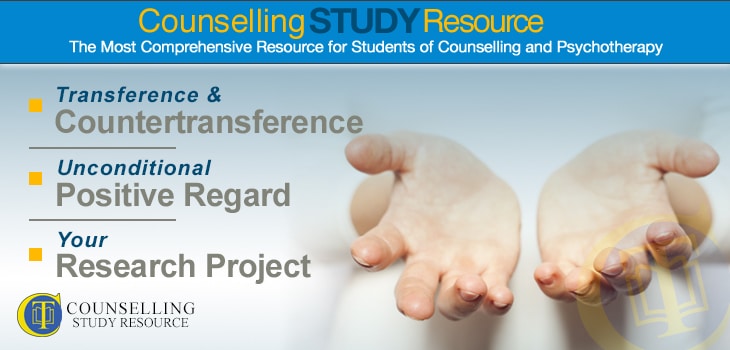037 – Transference and Countertransference – Unconditional Positive Regard – Your Research Project
In episode 37 of the Counselling Tutor Podcast, Rory Lees-Oakes and Ken Kelly talk about transference in the counselling room. ‘Theory with Rory’ examines unconditional positive regard (UPR). Finally, the presenters talk about doing your research project.
Transference and Countertransference (starts at 3.48 mins)
Transference occurs when you meet someone new, and attribute to them issues, behaviours and fantasies that relate to someone from your past. In other words, you bring the whole history of an old relationship into the new relationship, rather than seeing the new person for who they really are.
What happens when your client experiences transference in the therapy room? It can be hard to spot that this is happening, and can even lead to countertransference – when you react to the way the other person is acting towards you (in other words, you ‘play the part’ of the person in their history).
Of course, it can happen the other way round: you, as therapist, may experience transference towards the client, and the client may respond with countertransference. Either way, ask yourself: ‘Who am I to the client? And who is the client to me?’
Ken and Rory provide some practical tips on how to notice and tackle transference and countertransference:
- Develop your self-awareness so that you are more likely to notice and deal with transference, and to avoid responding with countertransference.
- Look out for the client ‘acting out’ or being very familiar towards you: these may be warning signs that they are experiencing transference towards you.
- Do you feel parental towards your client? If so, this could be a warning sign of transference.
- If you feel transference is taking place, ask your client: ‘Do I remind you of anybody?’
- Take any issues of possible transference to supervision: a good supervisor is always looking out for this.
- Check out more resources on transference and countertransference in Podcast 3, and find out about eroticised transference in Podcast 21.
Unconditional Positive Regard (starts at 17.20 mins)
Counselling students often wonder: ‘How can we look at all our clients with no judgement whatsoever? Is this possible?’ Illustrating his points with real-life examples, Rory talks about our tendency as humans to see only the parts of others we don’t like, and to dismiss or judge them on this basis.
Carl Rogers described the importance of UPR in his paper, ‘The Necessary and Sufficient Conditions of Therapeutic Personality Change’, published by the Journal of Consulting Psychology in the 1950s. In this, he wrote (p. 97):
To the extent that the therapist finds himself [sic] experiencing a warm acceptance of each aspect of the client's experience as being a part of that client, he [sic] is experiencing unconditional positive regard … It means that there are no conditions of acceptance, no feeling of ‘I like you only if you are thus and so.’ It means a ‘prizing’ of the person … It is at the opposite pole from a selective evaluating attitude – ‘You are bad in these ways, good in those.’
Even Rogers admits that he did not always find it easy to show UPR, citing an example of a session with an army officer in South Africa during the time of apartheid. Rogers said that he struggled to offer UPR in this case, but the officer reported he had felt accepted and that the session had been life-changing.
Rory offers three tips on UPR:
- Don’t just accept the parts of a person that you like. Try instead to see and reflect back all that the person is saying, not auditing or correcting the parts that you don’t like.
- Remember the quote: ‘I disapprove of what you say, but I will defend to the death your right to say it. (It is unclear who said this, some claiming it was Voltaire, others refuting this.) In other words, freedom of speech matters.
- It is not up to us to seek to change the client’s world views; instead, it is our job to help them make sense of their world, and to start the process of self-healing. Counsellors are not agents of social control.
It is really important that we see clients as fellow human beings, who are the results of the paths they have walked. We must somehow separate the sin from the sinner.
Your Research Project (starts at 25.32 mins)
In the UK, counselling training courses at level 4 and above typically include the need to complete a research project. This can feel quite daunting – working out where to get the information you need, how to bring it all together, what to put in and what to leave out, and how to present it to the class without getting overcome by nerves.
Ken and Rory offer their insights into this task, and recommend a book, Rory’s Easy Research. This offers great tips on doing your research project, using the acronym SMARTER: specific, measurable, agreed, realistic, ethical and recorded. This is available as a free download from this podcast (see download button above).


